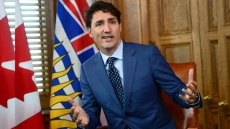OTTAWA — Parliament's spending watchdog is putting new numbers to the cost of matching recent U.S. business-tax changes, pegging the price to the federal treasury at more than double government estimates.
The parliamentary budget officer says in a report Wednesday that it would cost $36.7 billion over five years to let businesses write off 100 per cent of the cost of equipment and machinery from their taxes.
U.S. President Donald Trump's tax changes in late 2017 allowed businesses to expense the full cost of depreciable assets, such as buildings.
A year later, Finance Minister Bill Morneau's fall economic update allowed Canadian businesses to immediately write off the full cost of some types of machinery and equipment used for manufacturing or processing goods, and expense a larger share of newly acquired assets.
The hit to federal revenues was estimated to be about $14 billion over five fiscal years, which the government argued was needed to help businesses in Canada stay competitive.
In 2015, Canadian businesses spent more than $200 billion on new depreciable property, including buildings, intellectual-property rights, machinery and other equipment.
The PBO report says if Canada matched the U.S. move exactly, there would be a decline of $8.8 billion in tax revenue this year — much more than the almost-$5-billion for the measures in the 2018 fiscal update — with annual foregone revenue falling to $5 billion after five years and then "decreas(ing) significantly" thereafter as the measure is phased out.
The report also says businesses could also expense an estimated $164 billion in unused write-offs over the next two decades if Canada matched the United States, and reduce the amounts of tax they owe.
However, the PBO suggests the government could recoup some of the money: Companies will have higher after-tax incomes that can be used for dividends to shareholders, which in turn would increase revenues from personal income taxes.



